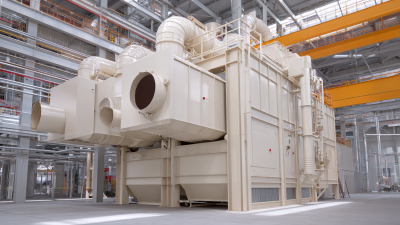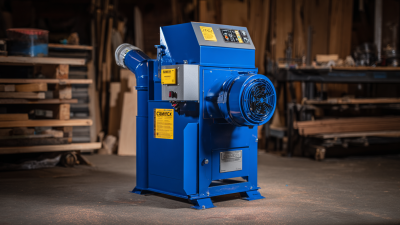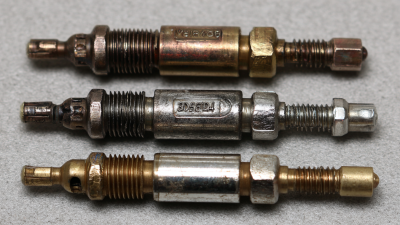Maximize Efficiency with the Right Filter Bag For Dust Collector in Industrial Settings
Table of Contents
- Understanding the Importance of Filter Bags in Dust Collection Systems
- Types of Filter Bags: Material Choices and Their Applications
- Assessing Filter Bag Efficiency: Key Performance Indicators
- Choosing the Right Filter Bag for Specific Industrial Processes
- Maintenance and Replacement Strategies for Optimal Dust Collection
- Future Trends in Filter Bag Technology for Enhanced Efficiency
- Effective Strategies for Choosing the Right Cartridge Filter for Optimal Dust Collector Performance
- FAQS
- Conclusion
- Related Posts
You know, in industrial environments, keeping the air quality up and processes running smoothly is a big deal. One of the key players in making that happen is the trusty 'Filter Bag' for dust collectors. Latest industry chatter shows that having an effective dust collection system can boost efficiency by up to 30%, and it also helps cut down on maintenance costs—pretty sweet, right? At Shanghai Jiongcheng Industrial Co., Ltd., we get how important it is to combine solid filtration solutions with our state-of-the-art lubrication tech. We’re experts when it comes to making high-quality lubricants—think compressor and vacuum pump lubricants—that work hand-in-hand with dust collectors by reducing wear and tear on the machinery. Picking the right filter bag isn't just about ticking boxes for environmental rules; it also helps your equipment last longer and perform better. All in all, it’s about taking a holistic approach to industrial efficiency—every part has its role in keeping things running smoothly and productively.

Understanding the Importance of Filter Bags in Dust Collection Systems
In industrial environments, filter bags really play a key role in keeping dust collection systems running smoothly. As industries gear up for some pretty impressive growth—did you know the global market for industrial dust collectors is expected to jump from about $8.27 billion in 2025 to nearly $12 billion by 2032, growing at roughly 5.4% annually? Because of that, understanding why filter bags matter is more important than ever. They do more than just trap dust and tiny particles; they actually boost the overall efficiency of dust collectors, helping companies stay compliant with environmental rules and breathe a bit easier about air quality.

If you’re aiming for the best results, picking the right kind of filter bag is crucial. Think about things like the size and type of particles you’re dealing with, chemical compatibility, and the temperatures your system operates at. Using filter bags made from advanced materials can really make a difference—they last longer and save you money over time. Of course, regular check-ups and swapping out filter bags when needed is a must if you want things to stay running smoothly.
A few tips: always match your filter bag material to the specific needs of your setup. Keep an eye on the pressure readings across the filter—if it starts to rise, it might be time for a new one. And investing a bit more in quality filter bags upfront can save you a lot on maintenance and disposal costs down the line. It’s all about keeping things efficient and cost-effective in the long run.
Types of Filter Bags: Material Choices and Their Applications
When you're choosing filter bags for dust collectors in an industrial setting, it’s pretty important to understand the different materials out there—you know, to make sure everything runs smoothly and efficiently. Usually, you’ll hear about polyester, polypropylene, and PTFE—each one has its own perks that fit different needs. For example, polyester filter bags are a common pick because they’re durable and can handle high temperatures, so they work well across a bunch of industries. Meanwhile, polypropylene tends to be a more budget-friendly option and does a great job resisting chemicals, which makes it perfect if you're dealing with corrosive dust.
Quick tip: When you're picking out a filter bag, think about the kind of dust you usually deal with. If it’s really fine stuff, go for a bag with a tight micron rating—better for capturing tiny particles. But if your dust is a bit coarser, then you might need something sturdier.
Now, PTFE filter bags are a bit of a luxury—they offer top-notch filtration for really fine dust particles and are great in chemical processes. The catch? They tend to be a little pricier. The key is to evaluate your environment and dust types carefully—that way, you’ll pick the right material, which helps your system work better and keeps your equipment running longer.
Another quick tip: Keep an eye on your filter bags’ performance with regular checks and maintenance, so you can catch any wear and tear early. Doing that not only keeps airflow steady but also cuts down on energy costs in the long run.
Assessing Filter Bag Efficiency: Key Performance Indicators
In industrial settings, how well filter bags perform in dust collectors really matters when it comes to keeping the environment clean and safe. You know, things like filtration efficiency (η F) and pressure drop (η P) aren’t just technical specs—they really affect air quality and how much energy costs. Recently, there’s been some cool progress with nonwoven filter media. These new materials are more porous and sturdy, which helps them trap dust better. Not only that, but they let air flow through more freely, so the machines don’t need to use as much energy. Pretty neat, right?
On top of that, there's this growing focus on balancing clean air with sustainability. Good filtration isn’t just about keeping stuff out; it improves indoor air quality (IAQ), which really matters for worker health and overall productivity. So, by fine-tuning these systems, industries can stay compliant with regulations and also cut down on energy costs. As companies keep investing in smarter filtration tech, keeping track of how well they work—through specific performance metrics—is key to getting the most out of them and being environmentally responsible in the long run.
Maximize Efficiency with the Right Filter Bag For Dust Collector in Industrial Settings - Assessing Filter Bag Efficiency: Key Performance Indicators
| Filter Bag Type | Material | Efficiency (%) | Airflow (CFM) | Dust Holding Capacity (grams) | Temperature Resistance (°F) |
|---|---|---|---|---|---|
| Polyester Filter Bag | Polyester | 99.5 | 1200 | 800 | 190 |
| Nomex Filter Bag | Nomex | 99.8 | 1000 | 1000 | 350 |
| PP Filter Bag | Polypropylene | 99.0 | 900 | 500 | 180 |
| P84 Filter Bag | P84 | 99.7 | 1100 | 900 | 260 |
| Fiberglass Filter Bag | Fiberglass | 99.9 | 1300 | 1200 | 500 |
Choosing the Right Filter Bag for Specific Industrial Processes
Hey, you know in industrial settings, the whole dust collection game really depends on picking the right filter bags for each specific process. It’s not just about catching dust; choosing the right filter bag can actually make everything run smoother and make your equipment last way longer. I read somewhere that according to the EPA, using the proper filter media can bump up particle catching rates by as much as 95%. That’s a big deal because it means less emissions and better air quality at work — especially in places like food manufacturing or pharma, where cleanliness is key.
Here at Shanghai Jiongcheng Industrial Co., Ltd., we get how important lubrication is for keeping machinery in tip-top shape. Our top-tier, high-temp chain lubricants are designed to work hand-in-hand with these effective filter bags. They help keep your machines running smoothly, even when things get tough. By paying attention to good lubrication, you can cut down on wear and tear, which means less frequent maintenance on your dust collectors. Honestly, taking a holistic approach—using both good filtration and great lubrication—can really boost productivity and keep things running sustainably in the long run.
Maximize Efficiency with the Right Filter Bag for Dust Collector
This chart represents the efficiency of different filter bag materials used in industrial dust collectors across various processes. Each material's efficiency is measured in terms of dust capture percentage.
Maintenance and Replacement Strategies for Optimal Dust Collection
Keeping your dust collection running smoothly in an industrial setting isn’t just about cleanliness—it’s about the air everyone breathes and how efficiently your operations run. A big part of that is the
filter bags in your dust collectors. Over time, these filters start wearing out and their performance drops, which can lead to more dust escaping and your system working harder than it should.
That’s why regular check-ups and swapping out filter bags on schedule are such a smart move—they really help keep the workspace clean and safe.
To get the most out of your dust collector, it’s super important to pick the right kind of filter bag that matches the kind of dust you’re dealing with and your specific needs. Don’t forget to inspect these bags periodically—if you notice signs of wear or clogging, it’s probably time for a change. Plus, keeping your entire dust collection system clean not only boosts air quality but also helps your equipment last longer.
Setting up a proactive maintenance plan and investing in good quality filter bags can make a world of difference, making sure your system is running at top shape, catching airborne dust better, and keeping productivity high.
Future Trends in Filter Bag Technology for Enhanced Efficiency
In industrial settings these days, everyone’s really feeling the pressure to have more efficient dust collection systems. That's actually pushing some pretty exciting changes in filter bag technology. Looking ahead, it seems like we’re moving towards using advanced materials—stuff that not only catches dust better but also lasts longer. Technologies like nanofiber and electrospinning are on the horizon, and they’re set to totally change the game. They’ll help us lower energy use, cut down on maintenance costs, and make the air cleaner for everyone.
If you really want to get the most out of your filter bags, here are a few tips: First off, pick the right bags based on the kind and size of dust particles you’re dealing with—that way, you’re not wasting resources on something that isn’t needed. Then, keep a close eye on your filter bags—check them regularly to see how they’re holding up and swap them out before they get too worn out. And don’t forget to stay in the loop about new materials and tech developments—staying updated can help you keep your system running at peak performance.
Looking towards the future, smart features like IoT connectivity for real-time monitoring and predictive maintenance are going to be a big deal. Jumping on these innovations not only boosts efficiency but also helps companies meet their sustainability goals in the long run.

Effective Strategies for Choosing the Right Cartridge Filter for Optimal Dust Collector Performance
When it comes to optimizing the performance of your dust collector, selecting the right cartridge filter is paramount. The design and functionality of the filter can have a significant impact on its filtration efficiency and dust management capabilities. One of the most effective strategies in this process is to consider filters with a unique concave fold pattern design, which provides a 100% effective filtration area. This innovative approach not only maximizes operating efficiency but also ensures that dust particles are captured effectively, reducing the risk of re-emission into the environment.
Durability is another critical factor in the selection of cartridge filters. Utilizing advanced foreign technology, specialized adhesive preparation enhances the bonding of filter cartridges, ensuring they withstand demanding operating conditions. This feature is complemented by optimal fold spacing, which guarantees uniform filtration across the entire area. Such design innovations help minimize pressure drops across the filter element and stabilize airflow within the dust collector, making it easier to maintain clean environments in spray rooms and powder handling areas. With the added benefit of a curved transition at the folding top, the effective filtration area is increased, thereby prolonging service life and supporting sustainable operations.
In conclusion, choosing a cartridge filter with these advanced features not only elevates filtration efficiency but also enhances the overall performance of dust collection systems. When selecting a filter, focusing on these design attributes will lead to superior operational results and long-term reliability.
FAQS
: Choosing the right filter bag is crucial as it enhances filtration efficiency, extends the lifespan of the dust collector, and can improve particulate capture rates by up to 95%, significantly reducing emissions and enhancing workplace air quality.
The use of effective filter bags, combined with optimized lubrication, minimizes wear and tear on machinery, which reduces the frequency of dust collector maintenance.
Current trends include advancements in materials, such as nanofiber technology and electrospinning, which improve filtration efficiency, durability, reduce energy consumption, and minimize maintenance costs.
When choosing a filter bag, consider the specific dust particle sizes and types present in your operation to ensure optimal performance.
It is important to regularly monitor the condition of filter bags and proactively replace them as needed to prevent any loss of filtration efficiency.
Future technologies include IoT integration for real-time monitoring and predictive maintenance, which can enhance operational efficiency and contribute to sustainability goals.
Proper lubrication complements effective filtration by ensuring machinery operates smoothly, thus reducing wear and tear and improving the overall efficiency of dust collection systems.
High cleanliness standards required in sectors like food manufacturing and pharmaceuticals make the selection of the correct filter bag essential for ensuring superior air quality.
Embracing advancements in filtration technologies can lead to reduced energy consumption and maintenance costs, thus supporting sustainability goals in industrial environments.
Staying updated on advancements allows businesses to utilize cutting-edge materials and technologies for improved filtration efficiency and operational effectiveness.
Conclusion
The article titled "Maximize Efficiency with the Right Filter Bag for Dust Collectors in Industrial Settings" really points out just how important filter bags are when it comes to dust collection systems, especially in different kinds of industrial setups. It talks about why picking the right filter bag material matters—based on what you’re actually using it for—and why it’s crucial to look at their performance metrics to see how well they’re working. Honestly, the main takeaway is that choosing the right filter bag can make a huge difference—helping your operations run smoother and cutting down on downtime.
Plus, the article shares some useful tips on how to keep these systems in tip-top shape—things like maintenance routines and when to swap out those filter bags for better performance. It also takes a peek into what’s coming next in filter bag tech, highlighting new developments that could boost efficiency even more in managing industrial dust. Since we're all about providing top-notch lubrication solutions at Shanghai Jiongcheng Industrial Co., Ltd., we totally get why efficient dust collection is a big deal—it’s a perfect partner to our advanced lubricants and tech designed for industrial efficiency.
Related Posts
-

Innovative Applications of Jet Dust Collector Dc-1200 in Modern Industry
-

7 Best Craftex Dust Collector Reviews for Efficient Industrial Use
-

How to Select the Right Thread Lubricant for Your Specific Needs
-

Understanding the Importance of Vacuum Pump Lubricants for Optimal Performance
-

Unlocking Industry Potential at the 138th China Import and Export Fair with Becker Vacuum Pump Lubricant
-

How to Choose the Right Elmo Rietschle Vacuum Pump Lubricant for Your Needs

